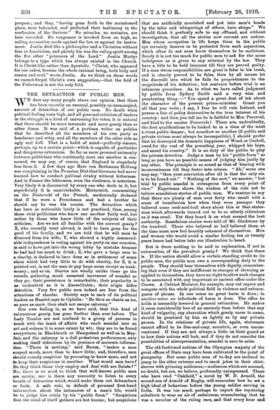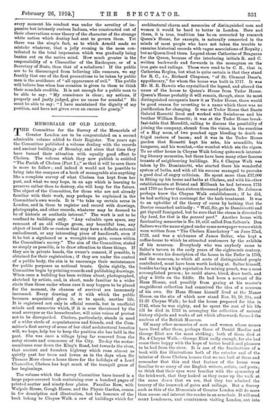THE DETRACTION OF PUBLIC MEN.
WE dare say many people share our opinion that there has been recently an unusual, possibly an unexampled, amount of detraction of our public men. No doubt when political feeling runs high, and all personal criticism of leaders in the struggle is a kind of canvassing for votes, it is natural that there should be more innuendo and more gossip than at other times. It was said of a partisan writer on politics that he described all the members of his own party as handsome and witty, and all the members of the other side as ugly and dull. That is a habit of mind—perfectly sincere, perhaps, up to a certain point—which is capable of particular and dangerous extensions. So far as mere personal animosity Letween politicians who continually meet one another is con- cerned, we may say, of course, that England is singularly free from it. A few days ago Herr von Bethinann Hollweg was complaining in the Prussian Diet that Germans had never learned how to conduct political rivalry without bitterness. And in France the bitterness, even the virulence, is notorious. Very likely it is discounted by every one who deals in it, but superficially it is unmistakable. Metternich, commenting on the Fraternal of the French, sardonically declared that if he were a Frenchman and had a brother he should say he was his cousin. The detraction which has been so noticeable lately is not practised, then, among those rival politicians who know one another fairly well, but rather by those who know little of the subjects of their criticism. Are we not all familiar with the current gossip ? X, who recently went abroad, is said to have gone for the good of his family, and we are told that he will soon be divorced from his wife; Y, who showed a highly commend- able independence in voting against his party on one occasion, is said to have got into the wrong lobby by mistake because he had had too much to drink ; Z, who gave a large sum to a charity, is declared to have done so in settlement of some claim which had very little to do with charity, for Z, it is pointed out, is not the man to pay large sums except as hush- money ; and so on. Stories not wholly unlike these go the rounds, gathering much unearned increment of scandal as they go; their persistence is remarkable; their popularity is as undoubted as it is discreditable ; their origin defies detection. Very few public men indeed are free from the attentions of slander. Society says to each of its political leaders as Hamlet says to Ophelia "Be thou as chaste as ice, as pure as snow, thou shalt not escape calumny."
Our own feeling is, as we have said, that this kind of calumnious gossip has gone further than ever before. The Lady Teazles are not confined to a group of persons in touch with the heart of affairs who exalt scandal into an art and redeem it to some extent by wit; they are to be found everywhere, in Blackheath or Hampstead as well as in May- fair, and the calumny is a dull pedestrian performance, only masking itself ridiculous by its pretence of accurate informa- tion. "There is nothing," said Bacon, "makes a man suspect much, more than to know little; and, therefore, men should remedy suspicion by procuring to know more, and not to keep their suspicions in smother. What would men have? Do they think those they employ and deal with are Saints ? " No; there is no need to think that well-known public men are saints ; nor is there any necessity to listen to every breath of detraction which would make them out debancheee or fools. A safe rule, in default of personal first-hand information about the intimacies of a man's life, would be to judge him solely by his "public form." "Suspicions that the mind of itself gathers are but buzzes; but suspicions that are artificially nourished and put into men's heads by the tales and whisperings of others, have stings." We should think it perfeotly safe to say offhand, and without investigation, that all the stories now current are untrue. Men whose occupation in life keeps them in the public, eye certainly deserve to be protected from such aspersions, which often do not even know themselves to be malicious. Surely it is not too much for public men to ask for the same indulgence as is given to any criminal by the law. They have a title to be held innocent till they are proved guilty. If a man whose responsibilities are great is false to his trust, and is clearly proved to be false, then by all means let the discredit into which he falls be proportionate to the magnitude of his defection ; but sentence before trial is an infamous procedure. As to what we have called judgment by public form Sydney Smith said a very wise and penetrating thing :—" You spend a great deal of ink about the character of the present prime-minister. Grant you all that you write ; I say, I fear he will ruin Ireland, and pursue a line of policy destructive to the true interest of his country: and then you tell me he is faithful to Mrs. Perceval, and kind to the master Percevals ! These are, undoubtedly, the first qualifications to be looked to in a time of the most anious public danger ; but somehow or another (if public and private virtues must always be incompatible), I should prefer that he destroyed the domestic happiness of Wood or Cockell, owed for the veal of the preceding year, whipped his boys, and saved his country." It is no duty of the public to play the private detective. Judge a man by his "public form" so long as you have no possible means of judging him justly by any other. The principle is as sound as that of bearing with inconveniences till they fester into crimes. " Ah," some one may say, "then your conviction after all is that the only sin is to be found out." "Nothing of the sort," we answer, "but trial by public scandal is outrageous from every point of view." Experience shows the wisdom of the rule not to believe scandalous stories of public men. We venture to say that there are plenty of men over forty who recall with a sense of humiliation how when they were younger they believed some cock-and-bull story about this or that states- man which afterwards turned out to be as utterly ridiculous as it was cruel. Yet they beard it on what seemed the best authority. Scandalous stories were told of Mr. Gladstone by the hundred. Those who believed or half believed them at the time must now feel heartily ashamed of themselves. Men and women who would avoid a similar feeling ten or twenty years hence had better take our illustration to heart.
But is there nothing to be said in explanation, if not in extenuation, of the prevalent gossip P We think that there is. If the nation should allow a certain standing credit to its public men, the public men owe a corresponding duty to the people. They should bear themselves with dignity, remember- ing that even if they are indifferent to charges of clowning as applied to themselves, they have no right to allow such charges to be associated with any important or ancient office under the Crown. A Cabinet Minister, for example, may cut capers and compete with the whole political field in violence and extrava- gance of phrase. In one sense no great harm is done ; in another sense an infinitude of harm is done. The office he holds is insensibly lowered in general estimation. He makes it seem considerably less of an anomaly than before that any kind of vulgarity, any aberration which gossip cares to name, should be practised by him as lightly as by any private person. In the relations of private life, again, statesmen cannot afford to be free-and-easy, eccentric, or even uncon- ventional. If they are not always a little on their guard as to bow their actions will look, and if they do not consider the possibilities of misrepresentation, scandal is sure to arise.
The old-fashioned notions of the Olympian majesty of the great offices of State may have been cultivated to the point of pomposity. But some public men of to-day are inclined to jump to the other extreme and to crack jokes in their shirt- sleeves with grinning audiences,—audiences which are amused, no doubt, but are, we believe, profoundly unimpressed. Those who have read " Oakfield," a novel by W. D. Arnold, the second son of Arnold of Rugby, will remember how be set a high ideal of behaviour before the young soldier serving in India. It was too much perhaps to expect the royetering subaltern to wear an air of sedateness, remembering that he was a member of the ruling race, and that every hour and
every moment his conduct was under the scrutiny of im- passive but intensely curious Indians, who constructed out of their observations some theory of the character of the strange white nation which destiny had sent to govern them. Yet there was the simple fact, as to which Arnold made no mistake whatever, that a jolly evening in the mess con- tributed to the total impression which was gradually being beaten out on the native mind. How much greater is the responsibility of a Chancellor of the Exchequer, or of a Secretary of State, than that of a subaltern ! If the public are to be discouraged from believing idle rumours, we say frankly that one of the first precautions to be taken by public men is the avoidance of "all appearance of evil." The public will believe less when less occasion is given to them to think their scandals credible. It is not enough for a public man to be able to say: "My conscience is clear ; my actions, if properly and justly judged, give no cause for scandal." He must be able to say : "I have maintained the dignity of my position, and have not given even an excuse for gossip."











































 Previous page
Previous page